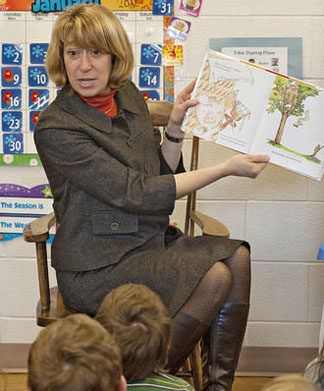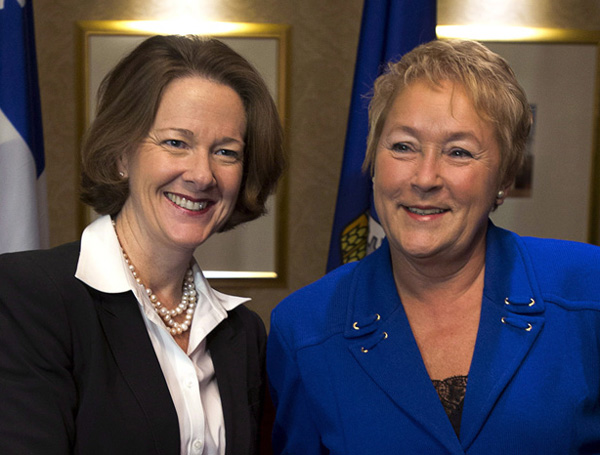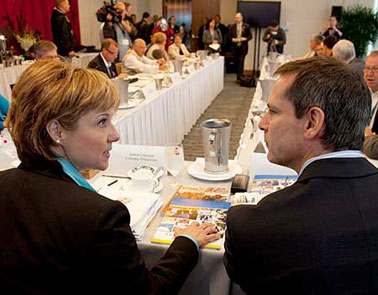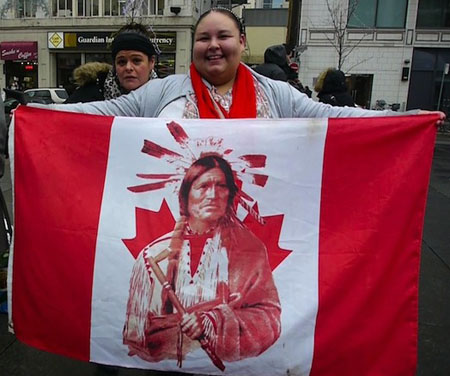Four big (central) Canadian stories in 2013 : Ontario teachers, more US fiscal cliffs, aboriginal peoples of Canada, and the future of Quebec ????
Jan 5th, 2013 | By Randall White | Category: In Brief
Ontario Minister of Education Laurel Broten reads to kindergarten students in Brantford, January 30, 2012.
I have just compiled a list of more than two dozen news articles from the past several days – all meant to enlighten me (as I see things, at any rate) about just what may or may not happen in the year 2013 that lies ahead.
My particular perspective, I should confess, is that of someone living in what the late, great (well sort-of) George Grant called “the Great Lakes region of North America” (way back in 1969, in the preface to his essay collection Technology and Empire). The assignment seems best suited to a somewhat expanded variation on the bullet-point style, beloved in so much bureaucratic prose :
* A Toronto Star headline from January 3, 2013 claims “Ontario teacher dispute: Turmoil far from over as Education Minister Laurel Broten imposes contracts.” It is not popular to say so out loud in the circles in which I customarily travel, but I am altogether fed up with this turmoil. And I intend to ignore it as much as I can if it really is far from over. I almost agree with “Andrew Coyne: Clash over Ontario teachers fuelled by culture of permanent confrontation and class-warfare rhetoric” from the January 4 online edition of the still appallingly unbalanced National Post. And this scares me. What worries me even more is the thought that teachers (and related public sector unions) are just laying the groundwork for a Tim Hudak Conservative takeover in the Ontario provincial election that may well lie not too far ahead in 2013 – much as the public sector unions in the Rae days of Ontario’s first and as yet only NDP government helped pave the way for Mike Harris’s mean and irrationally right-wing experiment of 1995—2003. Some lessons of even quite recent history, it seems, never do get learned.

“While Thomas Jefferson used an early machine that mirrored signatures and Harry Truman was reportedly the first US President to use the original autopen, the device was only put to use signing bills by Obama – based on a legal precedent set by George W. Bush.”
* I am similarly altogether fed up with the prospect that the maniacal public debate surrounding the recent last-minute “fiscal cliff”deal in the USA today is also far from over. I am and have always been deeply interested in politics, in all its shapes and sizes. But as with the Ontario teacher dispute, I am finding that I just can’t stand listening to the ongoing US fiscal (or tax and spending) policy debate – even on MSNBC TV. I’m thinking that in 2013 I might need a bit of a vacation from a lot of what currently passes for mainstream politics, in both Canada where I live and the friendly giant United States next door. Meanwhile I do think it’s a bit intriguing that: “Passing legislation to avoid the ‘fiscal cliff’ … was hardly automatic. But signing the bill was …Â President Obama on Wednesday authorized the use of the ‘autopen’ to enact H.R. 8, the compromise bill approved by lawmakers in the 11th hour after a long stalemate to avert the set of tax increases and budget cuts known as the fiscal cliff.” And doesn’t this just show how much George Grant’s late 1960s “technology” is still taking over so much of our lives, in so many different parts of the global village? (Well, again sort of, etc.)
* * * *
* Will 2013 be a year when Canadian politics – at both federal and provincial levels – pays much more attention to issues involving what the Constitution Act, 1982 now calls “the aboriginal peoples of Canada,” who certainly deserve more attention than they have been getting over the past few years? If it is, it will probably be because aboriginal peoples do have at least some strategic leverage over some of the resource development issues that so much concern both the Harper government in Ottawa, and especially the provincial governments of Alberta and BC. But I also think there remain many reasons for scepticism. See, eg: “Stephen Harper to meet First Nations leaders Jan. 11” and “No chief complaint: Idle No More’s vague demands butting up against PM’s pragmatism.”
I think as well that aboriginal leaders make a great mistake when they try to draw the British Crown into the debate. (As in “First Nations appeal to Queen Elizabeth.”) This just underlines the extent to which so many of their key current strategic concepts are rooted in political fantasy – a subject in which Mr Harper himself has much pragmatic expertise. Many of us who see the real (and very much post-colonial) Canadian political future as something with ultimate aboriginal roots would passionately welcome and reciprocate aboriginal support. Maybe when the aboriginal leadership starts to appreciate this, we might actually start to have the beginning of a workable future for all of us who now choose to live in the most northern regions of North America. (Where we already have a health care system that makes sense.)

Alberta Premier Alison Redford, left, and Quebec Premier Pauline Marois met during the premiers meeting in Halifax last November. Both won provincial elections in 2012, bringing the number of female premiers to a record-breaking five. (Andrew Vaughan/Canadian Press.)
* Political fantasy, of course, has always had a lot to do with Canadian politics. And, from one perspective, it is both logical and encouraging that the trend has now settled in comfortably in such articles as “Steward: Western Canada is definitely ‘in’ but no longer united” – by the former managing editor of the Calgary Herald but published in the Toronto Star, on the very last day of 2012. It is without any doubt a good thing that Gillian Steward is enlightening those of us who live in Toronto about the Western view of things. But her speculation that 2013 will be “the year when Alberta and British Columbia become the new Quebec and Ontario … When the duels between two western powerhouses dominate the national agenda just as the constitutional and political battles of Central Canada once took centre stage” is bound to strike any sensible Ontario resident as massive political fantasy.

BC Premier Christy Clark, left, speaks with Ontario Premier Dalton McGuinty during July 2011 meeting of the premiers and First Nations leaders at annual premiers conference in Vancouver. (Jonathan Hayward/Canadian Press.)
Set aside the plain facts that the combined population of Ontario and Quebec currently stands at some 21.6 million people – or 61.8% of the Canadian total, compared with 8.5 million or 24.4% of the Canadian total for Alberta and BC combined. It is also true that Preston Manning’s idea of the French fact in Canada as some kind of exclusive Ontario-Quebec concern remains another massive political fantasy – a plain fact to which Stephen Harper’s admirable command of French as a second language testifies. (And remember : it is the officially bilingual Stephen Harper and not Preston Manning who has finally become Alberta’s Canadian prime minister!) There are now increasing signs that in 2013 Quebec and the French fact in Canada will be returning to at least a significant part of the cross-Canada centre stage. See, eg: “Hébert: Crisis of political confidence overtakes Quebec” ; “Quebec politics: Wild and getting wilder” ; “Quebec 2013: A puzzle for political forecasters”; and “Justin Trudeau, Idle No More shake up Ottawa in 2013.” Which is not to say that Alberta and BC are not also growing extremely important, of course, of course. Yet at some point in 2013 at least a few far-sighted Canadians in the far west just might suddenly realize that the demographically (and even economically) very weighty Ontario and especially Quebec – which remains “not a province like the others” – have not exactly disappeared (in both Central Canada, and Canada from coast to coast to coast!) Or, the grip of Canadian regional chauvinism being what it is, maybe this will not happen in 2013 or any other time soon. But that still won’t make the sheer demography of Ontario and Quebec disappear – even if it does sometimes look that way in Calgary.


